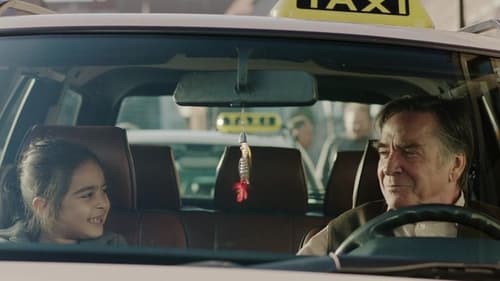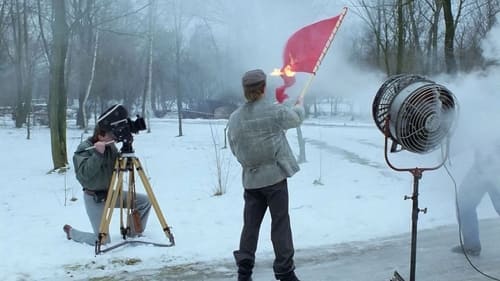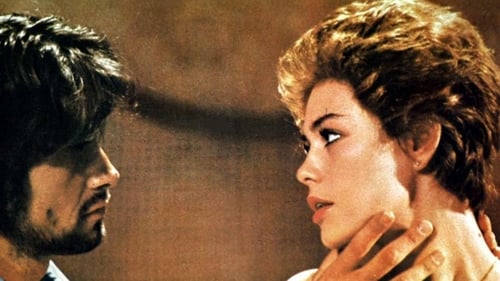Katja Rupé
Birth : 1949-09-18, München, Germany
History
Katja Rupé is a German stage and screen actress, writer and director. She was once a member of the progressive theater group La Mama in New York.

Baronne
A deadpan, picaresque buddy comedy about two old friends through a series of urban adventures, loosely connected by the skull of an executed French aristocrat. Winter Song is a typically irreverent Iosselianian jaunt through a classy Paris apartment block contemplating the past, present and future.

Christa Mackowiak
Hartmut Mackowiak, a German taxi driver, tries to help 6 year old Turkish girl to find her mother.

Oma Küblböck
Evil assassins want to kill Daniel Küblböck, the third runner up for the German Idols.

Chefin

Sabine Kehlmann

Lena Hirt
Pete is no stranger to success, delivering hit series as a musician in a rock group. When he parts ways with his band and produces his first solo LP, he learns for the first time what a flop means. He did not expect this. He is insecure and desperate, while Lena, his wife, accepts this low blow as a challenge. Jealously, Pete observes that Lena is becoming more and more independent and self-confident in her surroundings. At home there are arguments until everyone packs his bags. Alone with his longing and tenderness for Lena, Pete composes the "Bolero" on his white grand piano that calls her back.

Anna Mewis
A “film-noir” on double identity and role reversal. A man is looking for a woman to love. He finds her in a seedy bar and persuades her to marry him. The day she decides to flee… he kills her. To ward off suspicion, he moves in with the sister of the deceased.

Claire
The story revolves around two objects, a rare set of 18th-century Limoges china, and a 19th century aristocratic portrait. As these items are passed, sold, or stolen from one character to another, a giddy round dance of excess begins to take shape, one which suggests that if history doesn't repeat itself, it certainly rhymes. Together with co-writer Gérard Brach, whose other co-writing credits include Repulsion and Tess, Otar Iosseliani uses a feather-light touch to expose the futility of class and social order, making a bagatelle of the concerns of rich and poor alike.

Heinke
Set in Hamburg's “Hell's Kitchen,” a waterfront milieu of gangsters, pimps, dealers and prostitutes, the story follows the attempts of an ex-seaman first to insinuate himself into the scene, and then to extricate himself from it. He becomes a small-time pimp, sending his naive girlfriend out onto the streets thinking she is financing their middle-class future. When he becomes involved with an old pal, Nil, he increases his criminal portfolio. But when he steals Nil's girlfriend and things heat up, he leaves for his sister's middle-class home in Berlin, where his attempts to fit in are doomed from the start. Returning to Hamburg, he starts a rapid decline that delivers him into the waiting arms of Nil, whose revenge is merciless. Its emphasis more on milieu than on melodrama, Kiev is intended as a disturbing, hard look at the lives of bourgeois society's cast-offs whose existence, in Germany as elsewhere, is comfortably ignored or suppressed.

Eva
Nik, a released prisoner who started writing in prison, wants to leave his past behind him, but refuses to contact his former girlfriend and her family. Under the name of his jail buddy Henry, he moves in with his pen pal - who has never seen him - and is always watched suspiciously by their roommate. Nik began writing in prison and now seeks contact with the literary culture, even though he feels disgusted by the pompous fuss of this society. He is not without talent and works on a novel in which he minutely describes the abduction of an industrialist. Henry gets shot at the prison breakout and visits Nik to get help from him. He likes his novel plot and wants to put it into action.

Hilde Rust

Screenplay
Germany in Autumn does not have a plot per se; it mixes documentary footage, along with standard movie scenes, to give the audience the mood of Germany during the late 1970s. The movie covers the two month time period during 1977 when a businessman was kidnapped, and later murdered, by the left-wing terrorists known as the RAF-Rote Armee Fraktion (Red Army Fraction). The businessman had been kidnapped in an effort to secure the release of the orginal leaders of the RAF, also known as the Baader-Meinhof gang. When the kidnapping effort and a plane hijacking effort failed, the three most prominent leaders of the RAF, Andreas Baader, Gudrun Ensslin, and Jan-Carl Raspe, all committed suicide in prison. It has become an article of faith within the left-wing community that these three were actually murdered by the state.

Director
Germany in Autumn does not have a plot per se; it mixes documentary footage, along with standard movie scenes, to give the audience the mood of Germany during the late 1970s. The movie covers the two month time period during 1977 when a businessman was kidnapped, and later murdered, by the left-wing terrorists known as the RAF-Rote Armee Fraktion (Red Army Fraction). The businessman had been kidnapped in an effort to secure the release of the orginal leaders of the RAF, also known as the Baader-Meinhof gang. When the kidnapping effort and a plane hijacking effort failed, the three most prominent leaders of the RAF, Andreas Baader, Gudrun Ensslin, and Jan-Carl Raspe, all committed suicide in prison. It has become an article of faith within the left-wing community that these three were actually murdered by the state.

Franziska Busch
Germany in Autumn does not have a plot per se; it mixes documentary footage, along with standard movie scenes, to give the audience the mood of Germany during the late 1970s. The movie covers the two month time period during 1977 when a businessman was kidnapped, and later murdered, by the left-wing terrorists known as the RAF-Rote Armee Fraktion (Red Army Fraction). The businessman had been kidnapped in an effort to secure the release of the orginal leaders of the RAF, also known as the Baader-Meinhof gang. When the kidnapping effort and a plane hijacking effort failed, the three most prominent leaders of the RAF, Andreas Baader, Gudrun Ensslin, and Jan-Carl Raspe, all committed suicide in prison. It has become an article of faith within the left-wing community that these three were actually murdered by the state.

Irma
In this triangle melodrama, a woman shuts herself off from the world, rejects the advancement of her husband in society, and enthrones her own successor.

Magda Weberscheid
When Peter Huber the proprietor of a Bavarian corner newsstand, wins a free trip to New York City in a magazine contest, he is overjoyed. Filled with romantic ideas from the movies, his actual encounter with the gritty realities of the Big Apple are sobering. Nonetheless, he is in for the adventure of his life. First, he meets Karola Faber, the German wife of a U.S. G.I. who has found life in the States not all it's cracked up to be: she has left her husband and makes her living through prostitution. Peter and Karola visit the local German emigré community's Oktoberfest, and win the festival's King and Queen crown. Their prize is a cow, which accompanies them on their further journeys in New York City.

Petra
Pascale, married to an architect, misses her flight to London and is forced to stay in Berlin, at the Kleinhoff Hotel where she stayed as a student. Karl, a would-be revolutionary lives in the adjoining room and Pascale spies him and his ex-girl-friend through a hole. Then she follows him to a questionable place where she is arrested by the police during a revolutionists raid. When she returns to the Kleinhoff Hotel, Pascale finds Karl crying, and enters his room to console him and they have a love affair.

Leni

Anna
A young filmmaker becomes involved with a gangster in Berlin. Based on the Ulf Miehe novel Ich hab' noch einen Toten in Berlin.

Sonja












